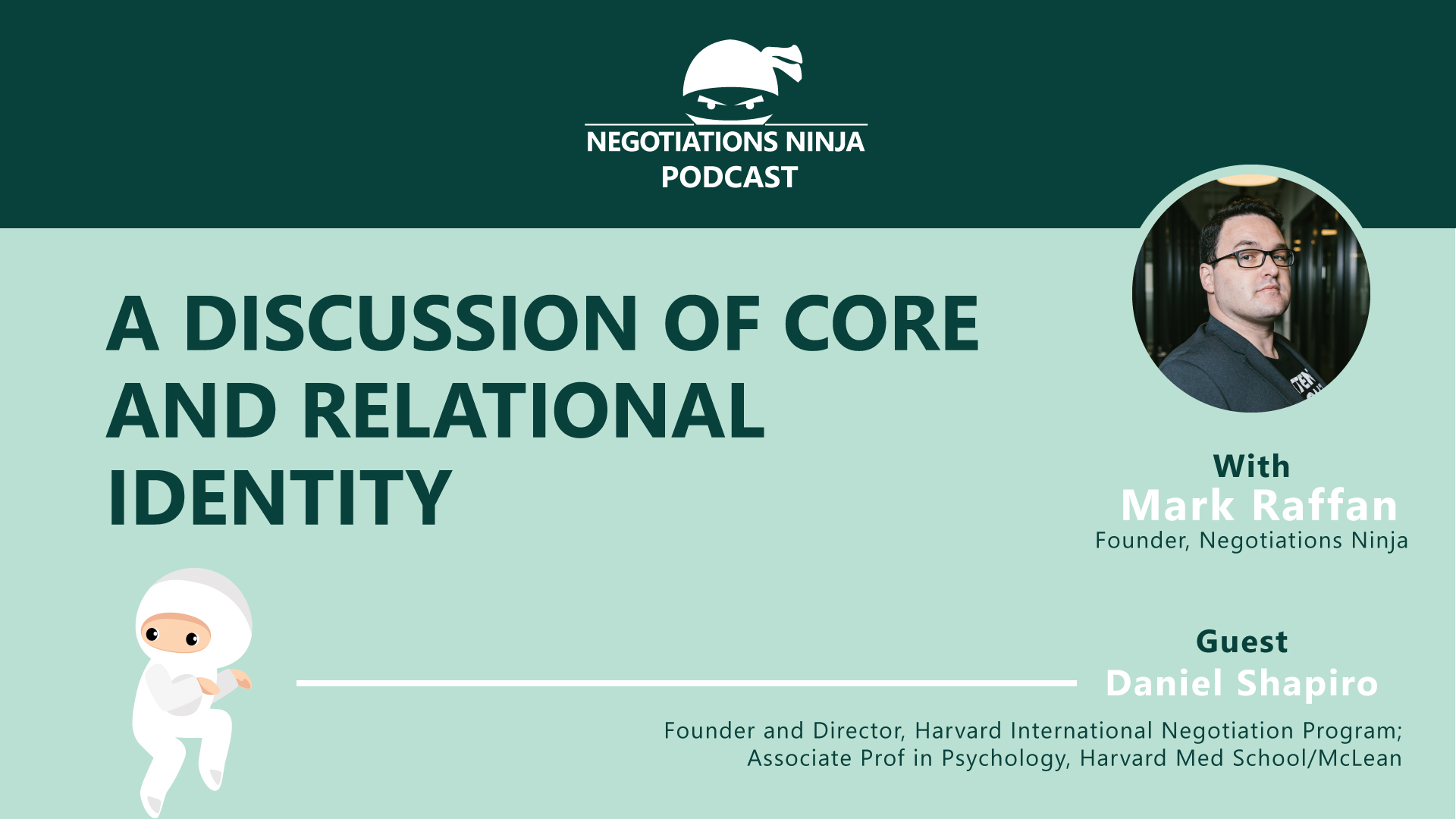How do you approach conflict-based situations? How does your core identity impact the negotiation? Daniel Shapiro believes that your relational identity comes into play in a negotiation. What does that mean? We have a deep conversation about identity, tribalism, and taboos in this episode of Negotiations Ninja.
Daniel Shapiro currently runs the Harvard International Negotiation Program. He briefly got involved in a deal 30 years ago doing work in Eastern and Central Europe, helping them transition from a closed to an open society. He’s worked with business, governments, hostage negotiators—a little bit of everything. Don’t miss his expert opinion.
Identity in the context of negotiation
Daniel says to imagine two businesspeople sitting at the negotiation table trying to sell or buy. Most people focus on the rational level—positions, interests, and wants. But negotiation is more than a chess game. Underlying the rational dimension is the emotional dimension. You may not like each other. You may be frustrated. Emotions come into the negotiation very quickly. Below the emotional dimension is identity. Who are you? Who are they? As you try to interact effectively, how do the perceptions you have of each other affect the process and the outcome of the negotiation? Identity consists of the characteristics that you use to define who you are as an individual or as a part of a group.
The two aspects of identity
Each side of a negotiation is so deeply entrenched in its own identity. They aren’t going to change—that’s your core identity. But if you’re stuck in that core identity, that equals lifelong conflict. A Republican won’t convert to a Democrat’s way of thinking, right? So what do you do?
It occurred to Daniel that there is another kind of identity: relational identity. What are the characteristics that define you in relation to someone else? How emotionally connected do you feel? Do you feel a sense of freedom or imposed upon? That type of identity becomes more fluid.
When you look at large scale conflict resolution, it becomes a place of opportunity. The core identity is a pillar that doesn’t change easily. But the space between you is fluid. You can work to affect the nature of your relationship, which takes on its own identity. Daniel emphasizes—that’s where possibility rests.
How to generate fluidity in the discussion
Daniel points out that you have to build a good relationship with the other side. People walk into negotiations assuming it’s “Me versus you,” and you’re there to battle it out. By doing so, you’re constructing a certain way of being that doesn’t allow for optimal outcomes. But if you shift the structure of the relationship to a working partnership, you can work together on shared differences. That’s where the possibility rests.
How do you restructure the relationship to make it more advantageous to your shared interests?
Both parties must recognize that they need to come to an agreement. But what happens when one party doesn’t want to agree? Can you generate that desire?
Daniel says to focus on your best alternative to a negotiated agreement (BATNA). It’s a huge source of power in negotiations. What’s the walkway alternative? Another client or buyer? You can try and weaken their BATNA. Make those alternatives less attractive to the other side (morally and ethically).
What cost could they be losing? Why not figure out the last details, so your time and money aren’t wasted? Weakening their BATNA strengthens yours. The stronger your walkaway alternative, the more powerful you are at the negotiating table.
Embrace the word “appreciate”
The word “appreciate” struck Daniel as naive, simplistic, soft, and fuzzy. But he has come to believe that it is an essential tool of effective negotiation. It goes beyond being grateful. To appreciate means three things:
- Understanding someone else’s perspective. You might cognitively understand, but you need to take it a step further.
- Find merit and value in what the other person thinks, feels, or does.
- Let them know you have a deeper understanding of them.
Learning to appreciate the other person’s perspective doesn’t mean you’re soft.
Daniel created a civil discourse project for his students this semester. They were assigned to meet with eight fellow students five times. They were told to identify an extremely sensitive political issue and deeply discuss that issue over five sessions. The challenge is trying to appreciate others’ perspectives. He’s not trying to get them to convert—just understand each other.
Negotiators often go in wanting their own perspective to be appreciated but don’t seek to appreciate the other sides. That is your power. Even in the most contentious negotiations, start by appreciating and understanding their perspective. It could take five minutes, or it could take five days. If the other side feels heard, understood, and valued, they’re going to open up to listen to you.
How do you have conversations about the things that are sacred to a person or an organization? What is the “lure of tribalism?” What’s so taboo about taboos? Daniel walks through his game-changing exercise in this episode of Negotiations Ninja.
Resources & People Mentioned
- Tony Blair: https://en.wikipedia.org/wiki/Tony_Blair
Connect with Daniel Shapiro
- Dan’s website
- BOOK: Negotiating the Nonnegotiable
- BOOK: Beyond Reason
Connect With Mark
- Follow Negotiations Ninja on Twitter: @NegotiationPod
- Connect with Mark on LinkedIn
- Follow Negotiations Ninja on LinkedIn
- Connect on Instagram: @NegotiationPod




